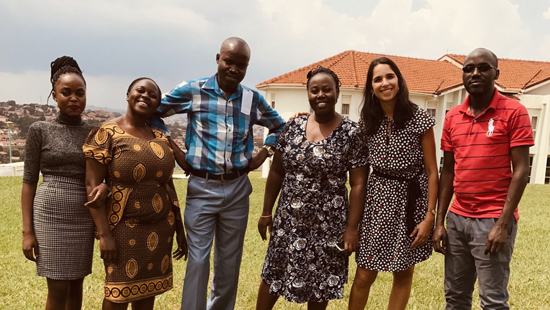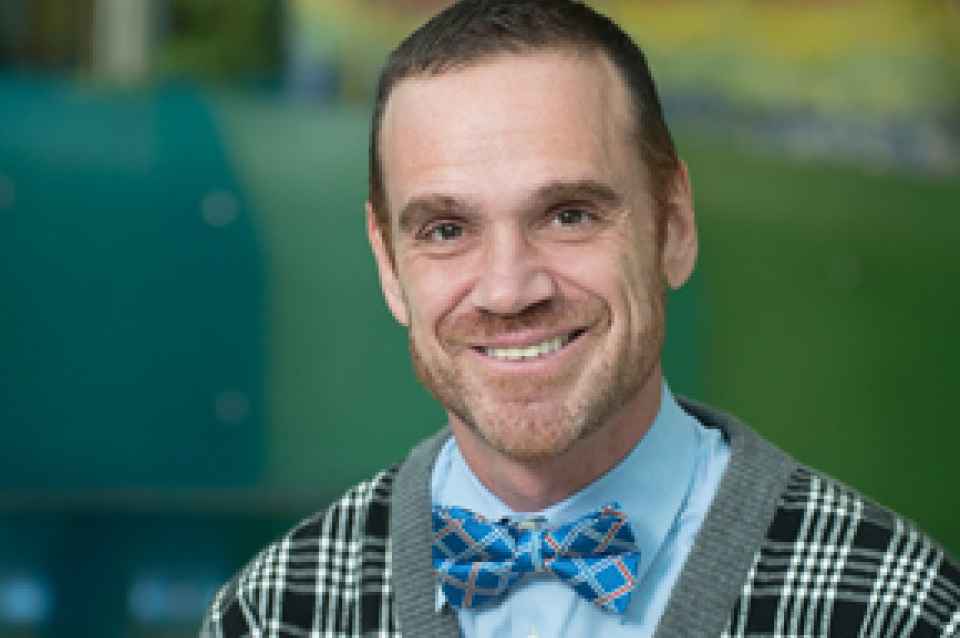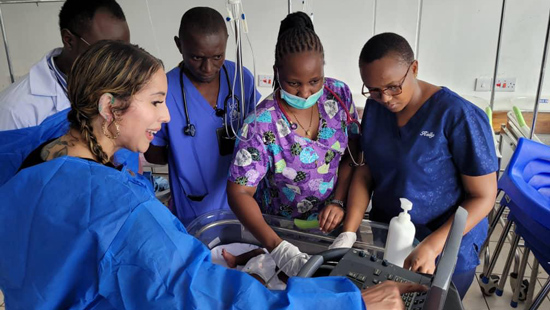Why Building Capacity Is Key to Better Global Health Outcomes

Sometimes it just takes a moment of chance to change the trajectory of patient outcomes. Rob Garofalo, MD, MPH credits fate to describe how his career took an unexpected and life-changing turn.
While getting settled into his airline seat, ready to fly to Paris for an AIDS conference in 2017, Garofalo’s Lurie colleague walked down the aisle. As fate would have it, his colleague stopped in his tracks—and told Garofalo and his then-unknown-to-him seatmate, Babafemi O. Taiwo, MD, that he was certain they would become fast friends.
Their colleague was right. By the time the plane landed, Taiwo booked Garofalo to give a lecture at Nigeria’s University of Ibadan. He wanted him to share the successes of the personalized text messaging intervention that Garofalo and his colleagues had developed to help HIV-positive young people successfully take their antiretroviral medications.
Garofalo said he was skeptical of the impact he could make.
“Admittedly, Nigeria was just not on my academic bingo card in terms of practicing global health. I even told friends that this would be a ‘one and done’ experience,” Garofalo said. “But Babefemi did something very smart, something he knew would keep me coming back.”
Taiwo convened a group of young gay men to talk about their experiences with HIV. The initial discussions were tough. Garofalo was an outsider, and HIV continues to carry a stigma in Nigerian society. It wasn’t until he shared that he also is HIV positive, that he was able to break down the barriers so the men felt they could candidly share their struggles. The group talked about the challenges of living with HIV, from getting tested to accessing health care to living in a society that criminalizes their very existence.
“As a gay man and someone living with HIV, I was inspired by their resilience and an amazing and caring healthcare and research team at the University of Ibadan,” Garofalo said. “And even though Babefemi and I barely knew each other at that point, I wrote an NIH grant proposal.”
With their first “Intensive Combination Approach to Roll Back the Epidemic in Nigerian Adolescents (iCARE Nigeria)” research grant, Taiwo and Garafalo worked with a multidisciplinary research team to conduct a pilot program in Ibadan.
The team used Lurie’s TXTXT text messaging intervention protocol that Garofalo and Lisa Kuhns, PhD, MPH developed, but adapted it to Nigerian culture, customs, and social media norms. The two-pronged program, comprising testing and treatment, combines mHealth strategies and peer navigation to improve adherence and HIV outcomes among young people in Nigeria. After iCARE Nigeria launched its initial phase in Ibadan, the study expanded to three more cities, Lagos, Jos, and Gamu.
Across the different cities, both arms of the study demonstrated promising results:
Another impressive statistic? More than 40% of the young men started to choose to go to government-funded clinics. Garofalo points out how the project is also helping to change the culture in these organizations, simply by the medical staff embracing the iCARE Nigeria projects.
“Our work in Africa, which centers on young people and health equity, is intentional in its design to focus on the health of SGM communities,” he said. “And I think it’s really making a difference to help people overcome the stigma of HIV.”
So, the interventions themselves were not just innovative, but in some ways transformative—not only for the staff and the communities we’re involved in but for me personally as well.”

These results helped Garofalo and his team from Northwestern University Feinberg School of Medicine, the Potocsnak Family Division of Adolescent and Young Adult Medicine at Ann & Robert H. Lurie Children's Hospital of Chicago, and the Robert J. Havey, MD Institute for Global Health secured a new NIH grant to scale the program to 12 sites across all six geopolitical zones in Nigeria over the next five years. While the primary goal of the study remains the same, this next phase will expand the scope to create cohorts of 1,000 young men in each zone to take preexposure prophylaxis (PrEP) and follow them over the course of a year.
Garofalo believes the iCARE Nigeria partnership has become a defining moment in his academic career at Lurie and Northwestern.
“From a public health perspective, it's an aspect of my job that just feels very meaningful to me,” he said. “Many of these places in Nigeria had never worked with gay men before. So, the interventions themselves were not just innovative, but in some ways transformative—not only for the staff and the communities we’re involved in but for me personally as well.”
He’s incredulous that a chance seating arrangement changed his path and his perspective on global health.
“I will forever be grateful to Babefemi for inspiring me to focus my energies on Nigeria and on this work,” Garofalo said. “This is where I need to be.”
Rob Garofalo, MD, MPH and Lisa Kuhns, PhD, MPH, are members of Robert J. Havey, MD Institute for Global Health, Center for Behavioral Intervention Technologies (CBITs), Institute for Public Health and Medicine (IPHAM), and Northwestern University Clinical and Translational Sciences Institute (NUCATS).

